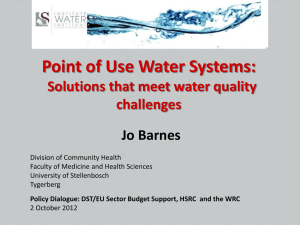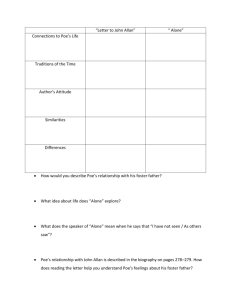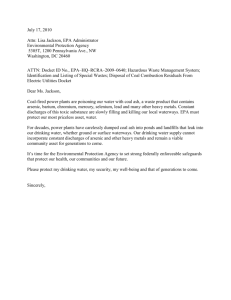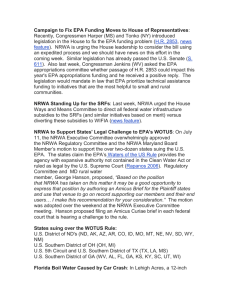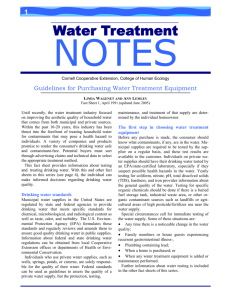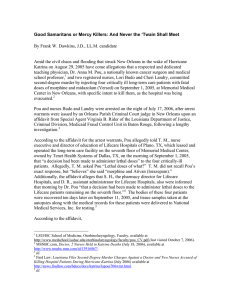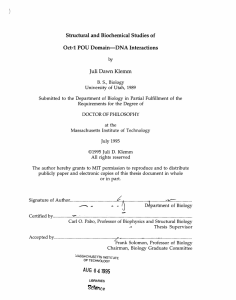8/10/15 - Ohio Rural Water Association
advertisement
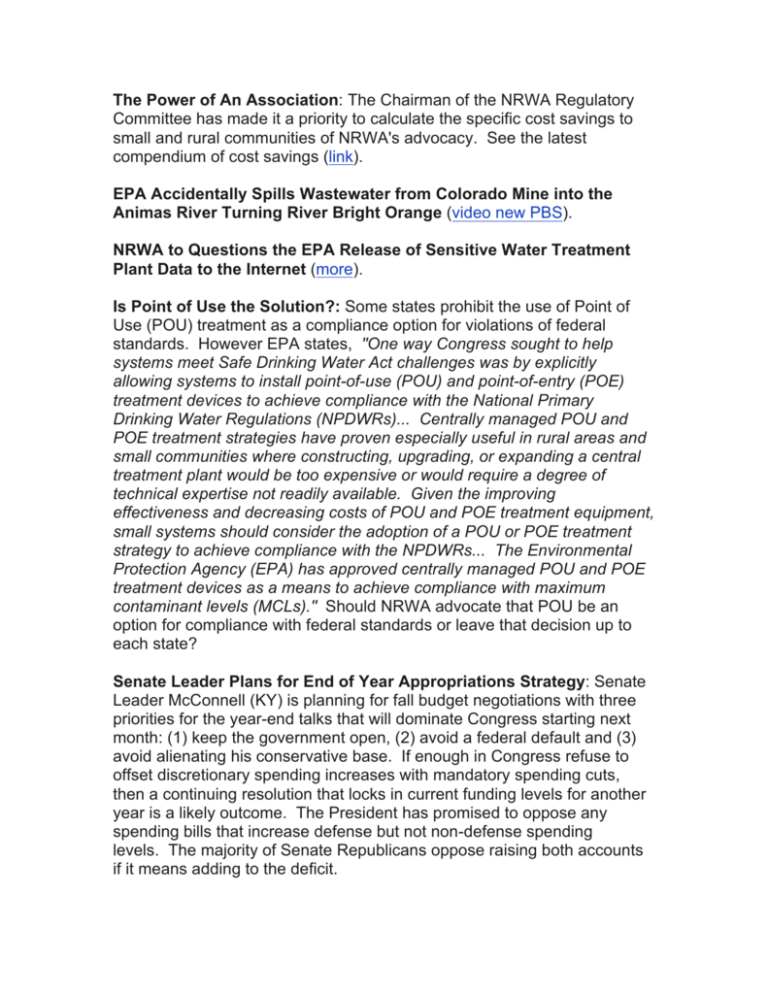
The Power of An Association: The Chairman of the NRWA Regulatory Committee has made it a priority to calculate the specific cost savings to small and rural communities of NRWA's advocacy. See the latest compendium of cost savings (link). EPA Accidentally Spills Wastewater from Colorado Mine into the Animas River Turning River Bright Orange (video new PBS). NRWA to Questions the EPA Release of Sensitive Water Treatment Plant Data to the Internet (more). Is Point of Use the Solution?: Some states prohibit the use of Point of Use (POU) treatment as a compliance option for violations of federal standards. However EPA states, "One way Congress sought to help systems meet Safe Drinking Water Act challenges was by explicitly allowing systems to install point-of-use (POU) and point-of-entry (POE) treatment devices to achieve compliance with the National Primary Drinking Water Regulations (NPDWRs)... Centrally managed POU and POE treatment strategies have proven especially useful in rural areas and small communities where constructing, upgrading, or expanding a central treatment plant would be too expensive or would require a degree of technical expertise not readily available. Given the improving effectiveness and decreasing costs of POU and POE treatment equipment, small systems should consider the adoption of a POU or POE treatment strategy to achieve compliance with the NPDWRs... The Environmental Protection Agency (EPA) has approved centrally managed POU and POE treatment devices as a means to achieve compliance with maximum contaminant levels (MCLs)." Should NRWA advocate that POU be an option for compliance with federal standards or leave that decision up to each state? Senate Leader Plans for End of Year Appropriations Strategy: Senate Leader McConnell (KY) is planning for fall budget negotiations with three priorities for the year-end talks that will dominate Congress starting next month: (1) keep the government open, (2) avoid a federal default and (3) avoid alienating his conservative base. If enough in Congress refuse to offset discretionary spending increases with mandatory spending cuts, then a continuing resolution that locks in current funding levels for another year is a likely outcome. The President has promised to oppose any spending bills that increase defense but not non-defense spending levels. The majority of Senate Republicans oppose raising both accounts if it means adding to the deficit. Houston Neighborhood Says Drinking Water Filled With Worms (more). Senate Passes HR 212, the Drinking Water Protection Act: The bill calls for EPA to develop a strategic plan to assess and manage risks associated with cyanotoxins in drinking water provided by public water systems. Maryville (MO) Issues Boil Advisory Due to Elevated Manganese Levels (more). Cyber Vulnerability: Security researchers at Dragos Security discovered at least 11 vulnerabilities in control switches being used in industrial control systems (ICS) across multiple sectors that could allow an attacker to execute man-in-the-middle (MitM) attacks to cause control systems to shut down a plant or process or force an ICS into a hazardous state. Researchers believe that the attacks are being exploited in the wild, and that the vulnerabilities are made possible by poor authentication protocols and cryptographic integrity (more) The Louisiana Rural Water Association's Water System Operator of the Year, Sharon Gillum: Ms. Gillum was given the honor at the annual awards banquet during the LRWA's 30th annual Training and Technical Conference in Lake Charles, LA. Gillum was selected as this year's winner for her dedication to providing safe drinking water and helping to maintain a cleaner environment through her efforts in the water and wastewater industry in the state of Louisiana (news). Wood County (WI) Plan to Monitor Large Farms' Water Impact: To more closely monitor how large farms use manure and chemical fertilizers, the county will hire a full-time employee whose primary job would be to increase the number of nutrient management plans farms file and step up enforcement of those plans (more). GAO Reviews SRFs: "Most of the 21 states GAO reviewed said that they have taken actions to enhance the financial management of their SRF programs, but that they generally cannot sustain their SRF funds without continued federal grants or changes to their programs, such as decreasing SRF program assistance or increasing revenue. Selected states' actions were aimed at three general areas: (1) raising SRF revenue directly, such as by charging higher administrative fees to borrowers; (2) increasing loan volume, which increases loans but does not necessarily increase revenue; and (3) improving financial planning, which can increase the number of loans, interest earned, or both." (GAO Report). National Rural Water Association Contact: Mike Keegan, Policy Analyst <keegan@ruralwater.org> (Washington, DC)

